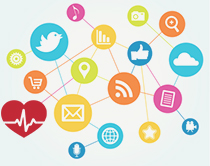Wednesday, October 15th, 2014
Anything on the internet can survive forever.
 While this sentence can be scary, it is, unfortunately, often too true. We – you, I, our friends and family – often use social media for communication and information gathering. There are sites, such as Twitter and Facebook, where people share much more than health care information, as well as health care and disease-specific sites such as Patients Like Me.
While this sentence can be scary, it is, unfortunately, often too true. We – you, I, our friends and family – often use social media for communication and information gathering. There are sites, such as Twitter and Facebook, where people share much more than health care information, as well as health care and disease-specific sites such as Patients Like Me.
There are definite benefits to using social media to solicit and receive support for our health related problems. For example, the disease-specific sites can help patients, especially those with rare diseases, identify peers and create a community.
As with anything digital, though, it is important to use discretion. When using the internet to seek out support, there are a few key things to remember:
Consumers interested in learning more about how to determine the validity and reliability of online health information can use trusted sources like these:
It is important for us, as consumers of health care, to become and remain engaged in our care. This means we need to access our information and, when appropriate, share our information with those who can help us. We also need to exercise caution with our information, for once it is posted or released on the internet it can almost never be retracted.
written by Susan Fenton, PhD, RHIA, FAHIMA

Dr. Susan Fenton is the Associate Dean for Academic Affairs and Professor at McWilliams School of Biomedical Informatics at UTHealth Houston, formerly UTHealth Houston School of Biomedical Informatics (SBMI). She is a member of the American Health Information Management Association’s Council on Excellence in Education, and her research interests include workforce development, data management, ICD-10 implementation and health care associated infections.